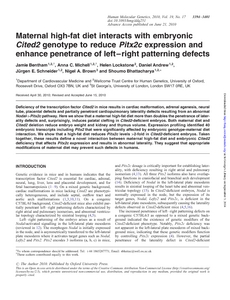Bentham, J; Michell, AC; Lockstone, H; Andrew, D; Schneider, JE; Brown, NA; Bhattacharya, S
(2010)
Maternal high-fat diet interacts with embryonic Cited2 genotype to reduce Pitx2c expression and enhance penetrance of left-right patterning defects.
HUMAN MOLECULAR GENETICS, 19 (17).
3394 - 3401.
ISSN 0964-6906
https://doi.org/10.1093/hmg/ddq251
SGUL Authors: Brown, Nigel Andrew
![[img]](https://openaccess.sgul.ac.uk/107134/1.hassmallThumbnailVersion/Hum.%20Mol.%20Genet.-2010-Bentham-3394-401.pdf)  Preview |
|
["document_typename_cannot open `/data/SGUL/sgul/eprints3/archives/sgul/documents/disk0/00/10/71/34/01/Hum.' (No such file or directory)
cannot open `Mol.' (No such file or directory)
cannot open `Genet.-2010-Bentham-3394-401.pdf' (No such file or directory)" not defined]
Published Version
Available under License St George's repository terms & conditions.
Download (286kB)
| Preview
|
Abstract
Deficiency of the transcription factor Cited2 in mice results in cardiac malformation, adrenal agenesis, neural tube, placental defects and partially penetrant cardiopulmonary laterality defects resulting from an abnormal Nodal->Pitx2c pathway. Here we show that a maternal high-fat diet more than doubles the penetrance of laterality defects and, surprisingly, induces palatal clefting in Cited2-deficient embryos. Both maternal diet and Cited2 deletion reduce embryo weight and kidney and thymus volume. Expression profiling identified 40 embryonic transcripts including Pitx2 that were significantly affected by embryonic genotype-maternal diet interaction. We show that a high-fat diet reduces Pitx2c levels >2-fold in Cited2-deficient embryos. Taken together, these results define a novel interaction between maternal high-fat diet and embryonic Cited2 deficiency that affects Pitx2c expression and results in abnormal laterality. They suggest that appropriate modifications of maternal diet may prevent such defects in humans.
| Item Type: |
Article
|
| Additional Information: |
© The Author 2010. Published by Oxford University Press.
This is an Open Access article distributed under the terms of the Creative Commons Attribution Non-Commercial License (http://creativecommons.org/
licenses/by-nc/2.5), which permits unrestricted non-commercial use, distribution, and reproduction in any medium, provided the original work is
properly cited |
| Keywords: |
Animals, Body Patterning, Dietary Fats, Embryo, Mammalian, Female, Gene Expression Regulation, Developmental, Genotype, Homeodomain Proteins, Humans, Male, Maternal-Fetal Exchange, Mice, Mice, Inbred C57BL, Pregnancy, Repressor Proteins, Trans-Activators, Transcription Factors, Science & Technology, Life Sciences & Biomedicine, Biochemistry & Molecular Biology, Genetics & Heredity, BIOCHEMISTRY & MOLECULAR BIOLOGY, GENETICS & HEREDITY, LEFT-RIGHT ASYMMETRY, LEFT-RIGHT AXIS, CRANIOFACIAL DEVELOPMENT, CARDIAC-MALFORMATIONS, TOOTH MORPHOGENESIS, HEART DEVELOPMENT, BODY-WEIGHT, MOUSE, OBESITY, OVERWEIGHT, 11 Medical And Health Sciences, 06 Biological Sciences |
| Journal or Publication Title: |
HUMAN MOLECULAR GENETICS |
| ISSN: |
0964-6906 |
| Related URLs: |
|
| Web of Science ID: |
WOS:000280704800009 |
| Dates: |
| Date |
Event |
| 2010-09-01 |
Published |
|
| URI: |
https://openaccess.sgul.ac.uk/id/eprint/107134 |
| Publisher's version: |
https://doi.org/10.1093/hmg/ddq251 |
Statistics
Item downloaded times since 10 Dec 2014.
Actions (login required)
 |
Edit Item |


